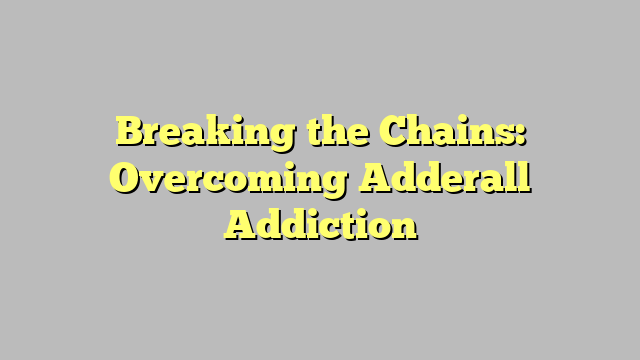
Breaking the Chains: Overcoming Adderall Addiction
In today’s fast-paced world, the pressures of academic or professional success can often push individuals to seek shortcuts to increase focus and productivity. Adderall, a prescription medication commonly used to treat attention deficit hyperactivity disorder (ADHD), has gained popularity among those looking to enhance their cognitive abilities. However, what begins as a well-intentioned aid can quickly spiral into a debilitating addiction, wreaking havoc on both physical and mental health.
The allure of Adderall lies in its ability to improve concentration and boost energy levels, making tasks seem more manageable and increasing productivity. For many, it provides a temporary escape from the demands of daily life, offering a sense of control and achievement. Yet, this seemingly beneficial solution can gradually morph into a harmful crutch, leading individuals down a destructive path of dependency and addiction.
Recognizing the Signs
Adderall addiction can manifest in various ways, affecting individuals physically, mentally, and emotionally. One of the key signs to watch for is an increased tolerance to the drug, where higher doses are needed to achieve the desired effects. This can lead to a dangerous cycle of escalating consumption.
Another common sign of Adderall addiction is the presence of withdrawal symptoms when the drug is not taken. These symptoms may include fatigue, irritability, and difficulty concentrating. Individuals may also experience cravings for Adderall and struggle to control their use despite negative consequences.
Furthermore, changes in behavior and social interactions can indicate a developing addiction to Adderall. This may involve a decline in academic or work performance, neglect of personal responsibilities, and strained relationships with family and friends. Being mindful of these behavioral shifts is crucial in recognizing the presence of an addiction.
Seeking Help
If you are struggling with adderall addiction, reaching out for help is a crucial step in your journey towards recovery. The first thing you can do is talk to a trusted friend or family member about your struggles. Opening up to someone you trust can provide you with emotional support and encouragement.
Try It Out
Seeking professional help is also essential in overcoming adderall addiction. Consider reaching out to a therapist or counselor who specializes in addiction treatment. They can provide you with the necessary tools and strategies to overcome your addiction and work through any underlying issues that may have contributed to it.
Support groups can be a valuable resource for individuals dealing with adderall addiction. Connecting with others who are going through similar experiences can help you feel less alone and provide you with additional motivation to stay committed to your recovery journey.
Healthy Recovery Strategies
In the journey towards overcoming adderall addiction, incorporating healthy habits and routines into daily life is crucial. Prioritizing regular physical activity can help boost mood, reduce cravings, and improve overall well-being. Engaging in activities such as yoga, walking, or jogging can provide a healthy outlet for stress and promote a sense of balance in recovery.
Establishing a supportive network of friends, family, or a therapist can also play a vital role in maintaining sobriety. Surrounding oneself with positive influences and individuals who understand the challenges of addiction can provide invaluable encouragement and motivation during the recovery process.
Additionally, focusing on self-care practices such as getting adequate sleep, maintaining a nutritious diet, and practicing mindfulness can contribute to a more stable and fulfilling recovery journey. Taking time to prioritize personal well-being and addressing underlying issues that may have contributed to addiction can facilitate long-term success in breaking the chains of adderall addiction.



